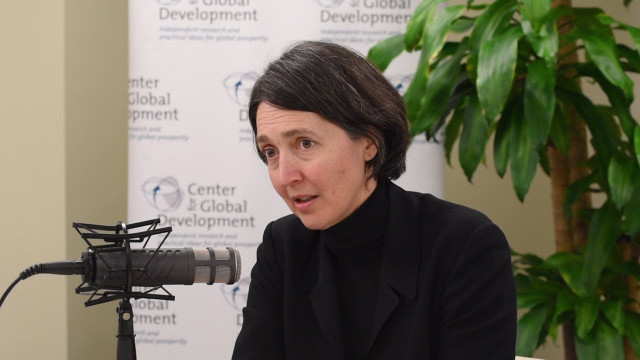'Implementation of reforms key challenge for PTI govt'
DFID Chief Economist Rachel Glennerster says Pakistan needs to prioritise its to-do list

Department for International Development (DFID) Chief Economist Rachel Glennerster. PHOTO: SCREENGRAB
Department for International Development (DFID) Chief Economist Rachel Glennerster is among those who want to see the government take tangible steps, instead of focusing on too many areas that can create difficulties in implementing structural reforms.
In a very brief interaction with a group of economic journalists on Tuesday, she said she saw implementation of economic reforms as the key challenge for the six-month old PTI government. “The main challenge for the government now is to think about where it wants to prioritise reforms and go from plans to detailed steps and start implementing things,” said Glennerster.
She said for long-term economic growth prospects or even if Pakistan was thinking about going to the International Monetary Fund (IMF) programme, the right thing to do was to get its own programme in place. Her advice was that the government needed to prioritise its to-do list and focus on “doable out of this very long list of things that could help improve economic development”.
The DFID chief economist argued that the government had good understanding of what needed to be done but now it was the question of taking tough decisions, taking the prioritisation forward and implementing them.
In its first quarter report released on Tuesday, the State Bank of Pakistan (SBP) also laid “particular emphasis on initiating the needed structural reforms in order to push the country’s productivity frontier and take the growth momentum forward.” The finance ministry is currently in the process of preparing what it calls homegrown five-year economic reforms framework.
However, it has put every imaginable thing in the framework, including over a dozen of new legislations that it cannot do in the given politically charged atmosphere. The central bank report and the comments made by the economist suggest the government remains
in the planning mode, which the country cannot afford at a time when it is again facing the dual challenge of a yawning budget deficit and current account deficit.
Despite presenting two finance bills in the National Assembly after coming to power, Finance Minister Asad Umar has not been able to give a clear direction to the economy.
Glennerster said the economic reforms were best when they were driven by the government that saw the benefits of bringing reforms and also had a strategy to explain benefits to the people. “There may be short-term pain but there are long-term benefits of reforms,” she stated. Responding to a question, she said it was not for the DFID to tell the government which sectors it should focus on out of the very long list.
But, she said, if the government was going to undertake really tough fundamental reforms, it was hard to do that in many sectors at a time. “You can work on lots of things but if you want to take tough long term decisions, it is quite hard to do in a lot of sectors.”
Glennerster said she was encouraged by lots of opportunities to improve the economic situation and the seriousness with which all people, either in the government or outside the government, were thinking about the reforms that were needed. There were also challenges in trade integration, energy and all macroeconomic sectors, she said, adding Pakistan’s future economic prospects depended a lot on what decisions the government took.
The DFID has also remained one of the largest donors in the social sector. Pakistan has estimated the receipt of $157.2 million worth of grant from the UK in the current fiscal year, of which during the first half, the UK disbursed slightly over $70 million, according to the Economic Affairs Division statistics.


















COMMENTS
Comments are moderated and generally will be posted if they are on-topic and not abusive.
For more information, please see our Comments FAQ